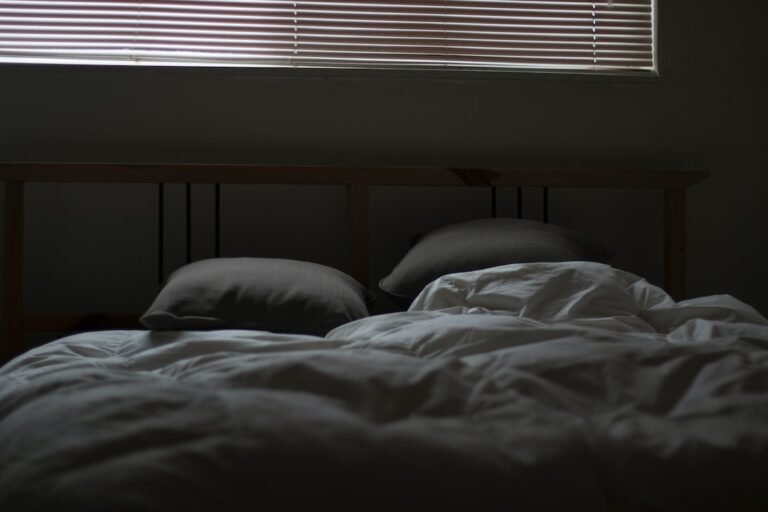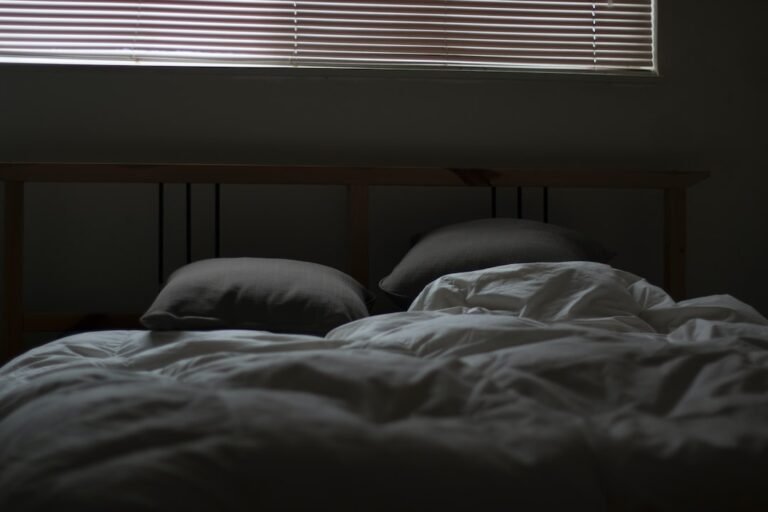Discovering the Power of Nature: 5 Natural Sleep Solutions for a Restful Night
Sleep is a fundamental aspect of our lives that is often overlooked or undervalued. However, getting enough quality sleep is essential for our overall health and well-being. It is during sleep that our bodies repair and rejuvenate, allowing us to function at our best during waking hours. In this article, we will explore the importance of sleep for optimal health, the negative effects of sleep deprivation, natural sleep solutions, the power of aromatherapy and herbal tea for relaxation and sleep enhancement, the role of exercise in improving sleep quality, creating a sleep-conducive environment, minimizing the impact of technology on sleep, mindfulness and meditation techniques for calming the mind and body, and the importance of consistency in sleep habits.
Understanding the Importance of Sleep for Optimal Health
Sleep is not a passive state; it is an active process that involves different stages. There are two main types of sleep: rapid eye movement (REM) sleep and non-rapid eye movement (NREM) sleep. NREM sleep consists of three stages: N1, N2, and N3. N1 is the lightest stage of sleep, while N3 is the deepest stage of sleep. REM sleep is characterized by rapid eye movements and vivid dreaming.
Each stage of sleep plays a crucial role in maintaining optimal health. During NREM sleep, our bodies repair tissues, build bone and muscle, and strengthen the immune system. REM sleep is important for cognitive function and emotional well-being. It is during REM sleep that our brains consolidate memories and process emotions.
In addition to its role in physical health, sleep also has a significant impact on mental health. Lack of quality sleep can lead to mood swings, irritability, difficulty concentrating, and impaired decision-making. Chronic sleep deprivation has been linked to an increased risk of developing mental health disorders such as depression and anxiety.
The Negative Effects of Sleep Deprivation on the Body and Mind
Sleep deprivation can have a detrimental effect on both our physical and mental health. In the short term, lack of sleep can impair cognitive function, making it difficult to concentrate and remember information. It can also lead to decreased alertness and increased risk of accidents.
In the long term, chronic sleep deprivation can have serious consequences for our health. It has been linked to an increased risk of developing chronic conditions such as obesity, diabetes, cardiovascular disease, and even certain types of cancer. Lack of sleep can also weaken the immune system, making us more susceptible to infections.
Sleep deprivation can also take a toll on our mental health. It has been associated with an increased risk of developing mood disorders such as depression and anxiety. Lack of sleep can exacerbate existing mental health conditions and make it more difficult to manage symptoms.
Natural Sleep Solutions: An Alternative to Medications and Supplements
While medications and supplements can be effective in promoting sleep, they often come with side effects and can be habit-forming. Fortunately, there are natural sleep solutions that can help improve sleep without the need for medication.
One of the most effective natural sleep solutions is making lifestyle changes. Establishing a regular sleep schedule, creating a relaxing bedtime routine, and creating a sleep-conducive environment can all contribute to better sleep. Additionally, practicing relaxation techniques such as deep breathing, progressive muscle relaxation, and guided imagery can help calm the mind and prepare the body for sleep.
Another natural sleep solution is aromatherapy. Aromatherapy involves using essential oils to promote relaxation and improve sleep quality. Lavender oil is one of the most popular essential oils for sleep due to its calming properties. Other essential oils that can promote relaxation and sleep include chamomile, bergamot, and ylang-ylang.
The Power of Aromatherapy for Relaxation and Sleep Enhancement
Aromatherapy is a holistic healing practice that uses essential oils to promote physical and psychological well-being. Essential oils are highly concentrated plant extracts that have been used for centuries for their therapeutic properties. When inhaled or applied topically, essential oils can have a profound effect on the mind and body.
Aromatherapy works by stimulating the olfactory system, which is responsible for our sense of smell. When we inhale essential oils, the molecules travel through the nose and into the brain, where they can have a direct impact on our emotions and mood. This is why certain scents can evoke specific feelings or memories.
When it comes to sleep enhancement, certain essential oils have been found to be particularly effective. Lavender oil, for example, has been shown to promote relaxation and improve sleep quality. It has a calming effect on the nervous system and can help reduce anxiety and stress. Other essential oils that can promote relaxation and sleep include chamomile, bergamot, and ylang-ylang.
To use essential oils for sleep enhancement, you can diffuse them in a diffuser or add a few drops to a warm bath before bedtime. You can also mix them with a carrier oil such as coconut oil and apply them topically to your wrists or temples.
The Benefits of Herbal Tea for Promoting Restful Sleep

In addition to aromatherapy, herbal tea can also be an effective natural sleep solution. Herbal teas are made from various plants and herbs that have calming and sedative properties. They can help relax the mind and body, making it easier to fall asleep and stay asleep.
One of the most popular herbal teas for sleep is chamomile tea. Chamomile has been used for centuries as a natural remedy for insomnia and anxiety. It contains compounds that have a calming effect on the nervous system and can help reduce stress and promote relaxation.
Other herbal teas that can promote restful sleep include valerian root tea, passionflower tea, and lemon balm tea. Valerian root has been used for centuries as a natural sleep aid and has been found to improve sleep quality and reduce the time it takes to fall asleep. Passionflower has sedative properties and can help calm the mind and promote relaxation. Lemon balm is known for its calming effects and can help reduce anxiety and promote restful sleep.
To enjoy the benefits of herbal tea for sleep, steep a tea bag or a teaspoon of dried herbs in hot water for about 5-10 minutes. Drink the tea about an hour before bedtime to allow enough time for the herbs to take effect.
The Role of Exercise in Improving Sleep Quality
Exercise is not only beneficial for our physical health but also for our sleep quality. Regular physical activity can help regulate our sleep-wake cycle and promote restful sleep.
Exercise has been found to increase the production of endorphins, which are natural mood boosters. It can also reduce levels of stress hormones such as cortisol, which can interfere with sleep. Additionally, exercise can help tire out the body, making it easier to fall asleep and stay asleep.
While any form of exercise can be beneficial for sleep, certain types of exercise have been found to be particularly effective. Aerobic exercise, such as walking, jogging, or cycling, can help increase the amount of deep sleep we get. Strength training exercises, such as weightlifting or resistance training, can help improve sleep quality and reduce the time it takes to fall asleep.
It is important to note that exercising too close to bedtime can have a stimulating effect on the body and make it more difficult to fall asleep. It is recommended to finish exercising at least 2-3 hours before bedtime to allow enough time for the body to cool down and relax.
Creating a Sleep-Conducive Environment: Tips for a Peaceful Bedroom
Creating a sleep-conducive environment is essential for getting a good night’s sleep. Your bedroom should be a sanctuary that promotes relaxation and tranquility. Here are some tips for creating a peaceful bedroom:
1. Keep it dark: Use blackout curtains or blinds to block out any light from outside. Light can interfere with the production of melatonin, a hormone that regulates sleep.
2. Keep it cool: The ideal temperature for sleep is between 60-67 degrees Fahrenheit (15-19 degrees Celsius). Keep your bedroom cool and use breathable bedding to prevent overheating.
3. Keep it quiet: Use earplugs or a white noise machine to block out any noise that may disturb your sleep. If you live in a noisy area, consider using a fan or a sound machine to create a soothing background noise.
4. Keep it comfortable: Invest in a good quality mattress and pillows that provide adequate support for your body. Choose bedding that is soft and breathable to promote comfort.
5. Keep it clutter-free: A cluttered bedroom can create a sense of chaos and make it difficult to relax. Keep your bedroom clean and organized to create a peaceful atmosphere.
The Impact of Technology on Sleep and How to Minimize It
Technology has become an integral part of our lives, but it can also have a negative impact on our sleep. The blue light emitted by electronic devices such as smartphones, tablets, and computers can interfere with the production of melatonin and disrupt our sleep-wake cycle.
To minimize the impact of technology on sleep, it is important to establish boundaries and create a technology-free zone in your bedroom. Avoid using electronic devices at least an hour before bedtime to allow your brain to wind down and prepare for sleep.
If you must use electronic devices before bed, consider using blue light filters or wearing blue light-blocking glasses. These can help reduce the amount of blue light exposure and promote better sleep.
Mindfulness and Meditation Techniques for Calming the Mind and Body
Mindfulness and meditation techniques can be powerful tools for promoting relaxation and sleep. These practices involve focusing your attention on the present moment and cultivating a sense of calm and awareness.
One of the most popular mindfulness techniques for sleep is deep breathing. Deep breathing involves taking slow, deep breaths in through your nose and out through your mouth. This can help activate the body’s relaxation response and promote a sense of calm.
Meditation is another effective technique for calming the mind and body. There are many different types of meditation, but one of the most common is mindfulness meditation. This involves sitting quietly and focusing your attention on your breath or a specific object, while allowing thoughts and sensations to come and go without judgment.
Practicing mindfulness and meditation techniques before bed can help quiet the mind and prepare the body for sleep. It can also help reduce anxiety and stress, which are common causes of sleep disturbances.
The Importance of Consistency in Sleep Habits for Long-Term Health and Well-Being
Consistency is key when it comes to establishing healthy sleep habits. Our bodies thrive on routine, and having a consistent sleep schedule can help regulate our internal clock and improve sleep quality.
It is important to go to bed and wake up at the same time every day, even on weekends. This helps train your body to recognize when it is time to sleep and when it is time to wake up. Avoiding naps during the day can also help regulate your sleep-wake cycle.
In addition to a consistent sleep schedule, it is also important to establish a relaxing bedtime routine. This can include activities such as reading a book, taking a warm bath, or practicing relaxation techniques. A bedtime routine signals to your body that it is time to wind down and prepare for sleep.
Sleep is an essential aspect of our lives that should not be taken for granted. Getting enough quality sleep is crucial for our overall health and well-being. By understanding the importance of sleep, implementing natural sleep solutions, creating a sleep-conducive environment, minimizing the impact of technology, practicing mindfulness and meditation, and establishing consistent sleep habits, we can prioritize sleep and reap the benefits of a good night’s rest. So, make sleep a priority and take the necessary steps to ensure you are getting the quality sleep you need for optimal health and well-being.







